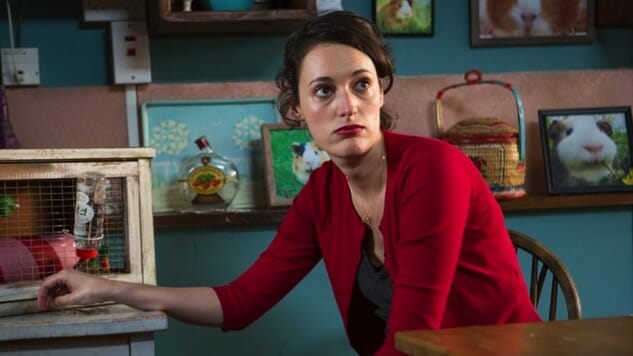Phoebe Waller-Bridge Talks Fleabag and Embracing the Dark, Twisted Side of Female Emotions

Watching the first season of Phoebe Waller-Bridge’s Fleabag and getting to know her title character is like dismantling a stubbornly built wall, brick by brick, until all that is left is for it to crumble. She wants to let you in to her fast-paced world and cheeky adventures, just not too close. She wants you to believe she’s fine and will go out of her way to prove it. She’ll turn her friend’s “accidental suicide” into a joke to stop you from trying to get to the real heart of her emotions. But Fleabag couldn’t be further from fine and, once you get to know her story and the people no longer inhabiting it, you’ll understand just why.
Fleabag was actually born from a dare set out for Waller-Bridge by one of her friends: to create a ten-minute piece for a stand-up style storytelling night. She then went on to develop this ten-minute affair into an hour-long one-woman play (winning the Edinburgh Fringe First Award in 2013), before finally taking over our TV screens this summer as an Amazon series. Waller-Bridge thrives on challenging her audience to acknowledge the emptiness and awkward discomfort present in her characters. The dark, twisted side of human nature is what really fascinates her, and this can be felt even in her light(er)-hearted comedies like Crashing.
We caught up with Waller-Bridge to discuss the depiction of female emotion in media, her writing process and Fleabag’s return for an 11-day run at the Soho Theatre in London, starting December 5th.
Paste Magazine: How does it feel taking Fleabag back to theatre?
Phoebe Waller-Bridge: I’m so excited because it feels like doing a full circle, really, it’s like coming back home. There were so many aspects of the play that never made it into the TV show. They wouldn’t actually have fit in the end, so it was the right decision. It’s going to feel more like I’m going to be visiting those other characters and other stories one more time at the end of this crazy cycle. It’s really nice.
Paste: Like the guinea pig. You didn’t get to kill him on the TV show.
Waller-Bridge: Didn’t get to kill the guinea pig. I would have really enjoyed killing the guinea pig in the series [laughs].
Paste: What is it with you and the guinea pig? Poor little thing…
Waller-Bridge: I know!! Actually, to be fair, [in the play] it’s to put her out of her misery. It’s not actually a brutal murder!
Paste: Fleabag is actually your second series this year. In Crashing, the character Sam is going through a grieving process similar to Fleabag’s, only his way of dealing with it is deemed normal, male behavior. What do you think it is that makes the female emotional/grieving process uncomfortable for some viewers?
Waller-Bridge: Yeah, that’s a good point actually. I suppose the cult of the strong woman character on TV has probably been misinterpreted in so many different ways, meaning that a woman can’t be emotionally complicated, or want things, or can’t be weak in moments. That was something that I was really excited about in writing this show, in that hopefully you’d see a woman trying to be your quintessential strong woman, for so much of the show. She always makes sure that she looks good, her hair’s nice, her make-up’s on. She’s got a good attitude about stuff. She’s flippant about sex. She’s in control of her body. She’s independent. She’s got all that shit going on, and she’s trying to convince the audience the whole time that she’s completely in control. And the bit that was really exciting was actually pushing her off the edge and saying that she’s actually a lot more complicated—which I think we all are, despite what our lipstick says.
-

-

-

-

-

-

-

-

-

-

-

-

-

-

-

-

-

-

-

-

-

-

-

-

-

-

-

-

-

-

-

-

-

-

-

-

-

-

-

-








































